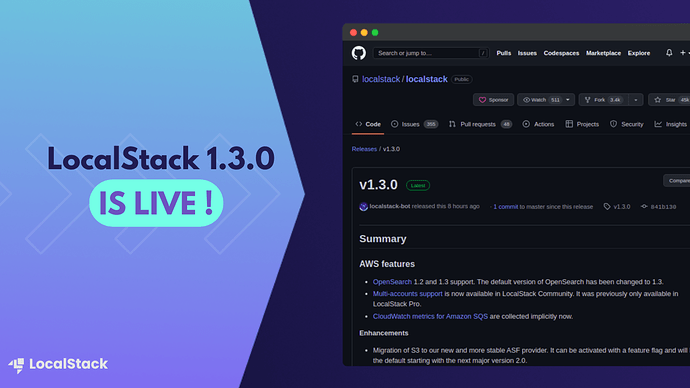We’re excited to announce the release of LocalStack v1.3.0! Over the course of this release, we have made multi-account support and base Cloud Pods functionality available to LocalStack Community, while migrating some of our AWS services to our new and more stable ASF provider. We have also established an all new localstack-pro image for licensed users to use LocalStack Pro APIs and features and an all-new documentation with tutorials, user-guides, and an improved table of contents.
Community Release
Our Community release features new enhancements and additions to support our Community users:
Cloud Pods for Community users
LocalStack now supports Community Cloud Pods to give our community users a chance to get started with some base Cloud Pods features. Using Community Cloud Pods, you get two commands: save and load to save the container state in a Cloud Pod and dump it into your running LocalStack container at any given time, respectively. Check out the Community Cloud Pods documentation to get started with persistence snapshots for community usage!
Multi-Accounts support for Community users
Multi-Accounts support is now available in LocalStack Community. It was previously only available in LocalStack Pro. This release also entails various bug fixes to the multi-accounts setup which allows namespacing based on AWS account ID and region name across all the AWS services in LocalStack by default (except Kinesis)! Refer to our Multi-Accounts documentation to get started with this feature!
Migration of S3 and Lambda to ASF provider
We have migrated S3 and Lambda to our new and more stable ASF provider. To activate the new ASF provider for S3, you can use the following flags:
- Community:
PROVIDER_OVERRIDE_S3=asf - Pro:
PROVIDER_OVERRIDE_S3=asf_pro
To activate the new ASF provider for Lambda, you can use the following flags:
- Community:
PROVIDER_OVERRIDE_lambda=asf
The Pro isn’t available yet, and it would be added with v2.0. With v2.0 the default will be changed to ASF, but the old provider will still be available (by using the feature flag with value legacy), though it would be removed in further releases.
New & Improved LocalStack Docs
LocalStack Documentation has adopted Diátaxis framework as our techncial documentation structure. Our documentation now features, tutorials, user guides, technical references, and contributing guide. We will continuously work on improving the LocalStack technical documentation to best support our users. Please create an issue for any documentation-level feedback!
Other changes and enhancements
- OpenSearch 1.2 and 1.3 support. The default version of OpenSearch has been changed to 1.3.
- CloudWatch metrics for Amazon SQS are collected implicitly now.
- Improved namespacing in DynamoDB with multi-account and multi-region support for all database operations.
- User-defined path support for setting up a custom SSL certificate.
- New LocalStack Package Manager (LPM) features to install packages to specific targets and specific versions of packages.
- Kubernetes support to set up LocalStack on a K8s cluster via a Helm chart.
Pro Release
Our Pro release features a lot of new enhancements and additions to support our licensed users:
New localstack/localstack-pro image for licensed users
LocalStack now features a localstack-pro image which consists of all Pro services and APIs for our licensed users. Currently, using an API key with the localstack image will show a warning, but with v2.0 release, we will shift over to using the localstack-pro image for all the Pro operations. We recommend you to pull the localstack/localstack-pro image to get started with this!
Experimental BigData Mono Container Support
LocalStack now features BigData Mono Container Support to allow starting BigData components without the localstack/bigdata image. To activate the feature, we recommend you to use the BIGDATA_MONO_CONTAINER feature flag, which currently defaults to false. The current support is experimental but with v2.0, the BigData Mono Container would be used as a default and localstack/bigdata image would be deprecated.
Other changes and enhancements
- A simplified version of the Cloud Pods CLI.
- Secret scanning for leaked API keys on GitHub support by LocalStack and GitHub.
Deprecations
- Deprecating
localstack-lightandlocalstack-fullimages - Removal of legacy SQS, API Gateway, and Kinesis provider
- Deprecating Legacy IAM Enforcement
- Deprecating
SYNCHRONOUS_*_EVENTS - Deprecating
USE_SINGLE_REGIONandDEFAULT_REGION - Deprecating
MOCK_UNIMPLEMENTED - Deprecating
SKIP_INFRA_DOWNLOADS - Deprecating legacy Init scripts
- Deprecating root-level non-AWS endpoints
Refer to our extended deprecation notice to know about the specifics of each deprecation.

